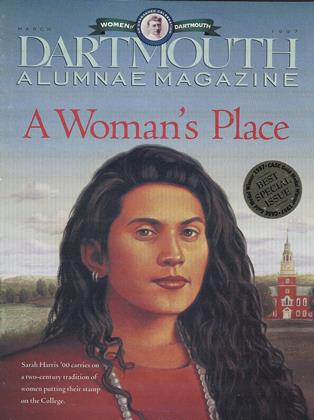Dartmouth was, for me, a very hard place to be a woman. Social space was owned and controlled by men. During my freshman year, it was important to me to be social because I hadn't found a group; I hadn't yet defined myself. During that first fall everyone was going out to the fraternities, even though freshmen weren't supposed to be allowed in them. We learned pretty quickly that if you're a woman and wear tight jeans and put on some lipstick and smile really pretty, then the guy who's drunk at the door will let you in. I went along and played the game. In the winter term I was sexually assaulted and got badly hurt. Every woman I was close with at Dartmouth had an incident of some kind, whether it was being felt up in a fraternity basement or something more scary, like date rape.
The Greek system was a bastion of institutionalized sexism. I was shocked to learn what was said at house meetings, what derogatory names were written on the basement walls. I felt threatened enough to think about leaving. Instead, I decided to stop going along with everything, and look at the system through a political lens. I started questioning what that behavior meanti what it meant to have to dress up and look sexy in order to get a beer.
I became part of a campus-wide consciousness raising. My freshman spring I helped put out the first issue of Spare Rib, a feminist newspaper, and took over the editorship the next year. That was a strong community of women, though we didn't see all things the same way. Spare Rib got people talking.
Dartmouth forced me to define myself politically. What did I believe in? What was worth fighting for? My sophomore year I came out as a bisexual I joined a group for women who were questioning their sexuality, or who just wanted to talk about gender issues. That group created a space for self-discovery and for thinking about what it meant to be a woman who was not straight in a very straight world. It gave women another place to be heard.
Women at Dartmouth don't belong to one big community. There are pockets of support, small niches. What I hope to see, over time, is those pockets growing. The gap between men's and women's social space narrowing. More group situations that aren't inherently linked to the Greek system. I hope to see more access for women, more visibility. More forums for women's voices.
Diana Sabot is studying at Oxford University as a Rhodes Scholar.
 View Full Issue
View Full Issue
More From This Issue
-
 Feature
FeatureA Sluggo's Sister Chooses Dartmouth
March 1997 By Gail Sullivan '82, T'87, and Robert Sullivan '75 -
 Feature
FeatureDartmouth HERSTORY
March 1997 -
 Feature
FeatureBeyond PARITY
March 1997 By Rebecca Bailey -
 Feature
FeatureKnowing Squat About the Woods
March 1997 By Heather Killebrew '89 -
 Feature
FeatureDartmouth's Most Influential Women Influential Women
March 1997 By Patricia E. Berry '81 -
 Feature
FeatureWhy Dartmouth is Better with Men
March 1997 By Jane Hodges
Article
-
 Article
ArticleBASEBALL
July 1919 -
 Article
ArticleSHORTS
November, 1930 -
 Article
ArticleIn Washington
October 1942 -
 Article
ArticleMasthead
Nov - Dec -
 Article
ArticleUseless Dartmouth Information
February 1942 By LEON BURR RICHARDSON '00 -
 Article
ArticleStatement of Ownership, Management and Circulation (required by 39 U.S.C. 3685).
NOVEMBER | DECEMBER 2013 By Sean Plottner

